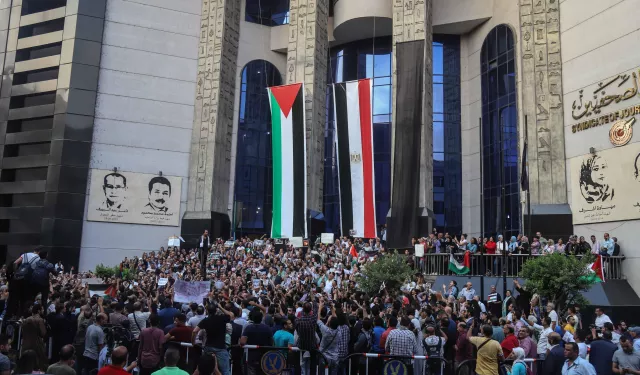A broad coalition of Egyptian political parties, rights organizations, lawyers, journalists, and public intellectuals has formally demanded that the government rescind the 1979 Egypt–Israel peace treaty, and terminate all normalization efforts. The signatories explicitly linked the treaty to Israel’s ongoing military assault on Gaza, framing it as a structural enabler of Israeli genocide.
In a statement issued Sunday, the coalition characterized Israel’s nearly two-year campaign against Gaza as a “genocidal war of starvation,” further denouncing the “roaming of occupation warplanes over Arab capitals.” They argued that these outcomes were the logical consequences of the Camp David Accords, which they contend disregarded Palestinian statehood, and fractured collective Arab solidarity.
This appeal followed closely on the heels of Israel’s lethal strike on the Hamas negotiation team in Doha, who were in Qatar's capital to weigh Trump's latest ceasefire proposal. The strike killed five members of the movement—including the son of senior Gaza figure Khalil Al-Hayya—along with a Qatari security officer.
The incident prompted an Arab-Islamic extraordinary summit to convene in Qatar, where participants condemned the assault as a violation of international norms and a direct threat to peace negotiations.
The coalition set forth a series of demands. Egypt should join South Africa’s genocide case against Israel before the ICC; the release of all detainees held over solidarity with Palestine; permit journalists and medical delegations to cross Rafah at their own discretion; and authorize the Egyptian Sumud flotilla vessels to join the global movement in an effort to break the siege on Gaza.
The timing of the statement underscores its symbolic weight, coinciding with the 47th anniversary of the Camp David Accords on September 17, 1978, which culminated in the March 26, 1979 treaty signed under US President Jimmy Carter. Against the backdrop of Israel’s ongoing genocidal campaign in Gaza since Oct. 7, 2023 domestic calls to revoke the treaty have intensified.
Atef Maghawri, parliamentary leader of the Tagammu Party, reiterated his longstanding position that the treaty should be annulled, likening the current moment to Egypt’s abrogation of the 1936 Anglo-Egyptian Treaty. Quoting former Prime Minister Mostafa Al-Nahhas “I signed the agreement for Egypt, and I annul it for Egypt,” Maghawri argued that Israel’s repeated violations, unrelenting assaults on Palestinians, and threats to Egyptian sovereignty render the treaty both obsolete and dangerous.
State Response and Regional Implications
The Egyptian state has already signaled its apprehension. In February, Cairo warned Washington, Tel Aviv, and European capitals that any attempt to forcibly displace Palestinians from Gaza would place the treaty in jeopardy, pledging to resist such measures.
At Monday’s emergency summit in Doha, President Abdel Fattah El-Sisi directly addressed Israeli society saying “What is currently unfolding undermines the future of peace, threatens your security and the security of all peoples in the region, erodes opportunities for any new peace agreements, and even aborts existing peace accords with the nations of the region. The consequences will, then, be severe.”
The statement signatories the Egyptian Socialist Party, Revolutionary Socialists, Popular Alliance Socialist Party, Bread and Freedom Party (under formation), Karama Party, Al-Nadeem Center, and the Journalists Syndicate’s Committee for Supporting the Palestinian People. A number of prominent individuals also endorsed the statement, such as lawyer Ahmed Abo Elela Mady, poet and activist Ahmed Douma, writer Ahmed Al-Khamisi, engineer Ahmed Bahaa Shaaban, human rights lawyer Gamal Eid, and physician Karima Al-Hefnawi. They also include rights lawyers Ragaia Omran, Azza Suleiman, and Mahienour Al-Massry.
